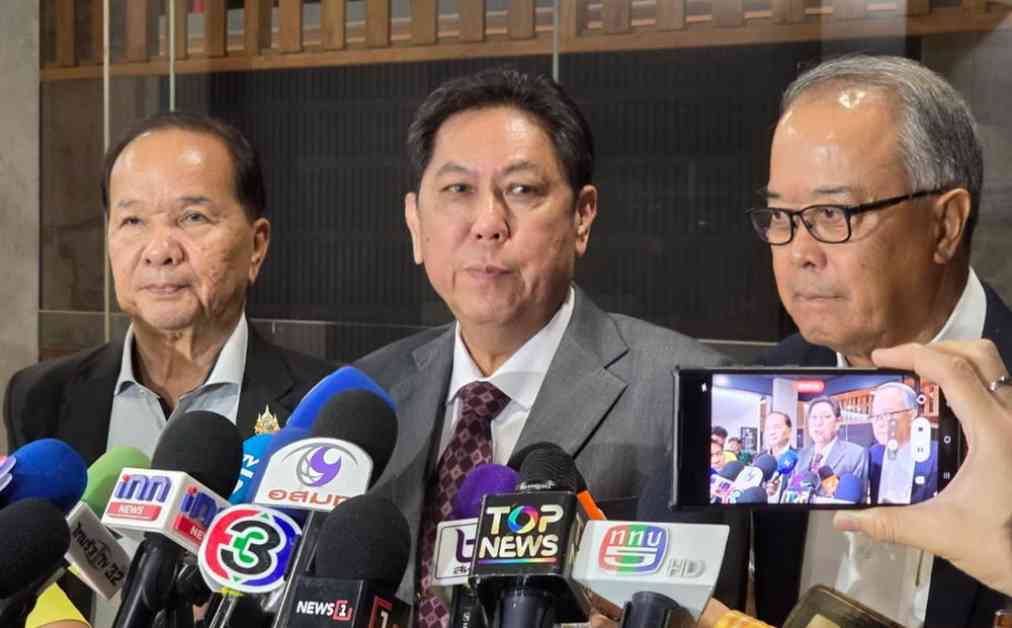Thailand’s National Assembly Elects New President and Forms Cabinet
In a recent development in Thai politics, the National Assembly has elected a new President and is in the process of forming a new cabinet. The announcement was made by the government on August 19th, 2567, at the State Assembly. Mr. Wisut Chiyanurun, in his capacity as the chairman of the coalition committee of the government party, and Mr. Chusak Sirinil, a member of the Democrat Party, revealed the details before the government meeting today.
Mr. Wisut stated that discussions would be held on the details of the Royal Decree on Elections, which was issued in 2564, and the drafting of a bill to repeal the announcements and orders of the National Peacekeeping Council (NPKC). As for the election of the President of the National Assembly to fill the vacant position, Mr. Chusak mentioned that there is a pressing need to expedite the formation of a new cabinet for the legislative branch. This includes allocating positions according to political quotas, as agreed upon by the parties involved. Therefore, it was decided that both processes should proceed simultaneously to ensure a smooth transition.
Previously, the selection of the President was considered separately for the legislative and executive branches, even though they are allocated based on party proportions. However, it was deemed more efficient to address both issues concurrently to avoid any complications regarding ministerial quotas. Mr. Chusak emphasized the importance of collaborative efforts within the working committee to determine the best course of action. The question of whether there will be a rotation of positions is still under consideration, as it depends on the composition of the cabinet and the appropriate allocation of roles in the legislative branch.
Challenges and Considerations in Forming the New Cabinet
The formation of a new cabinet poses several challenges and considerations for the government. One of the key issues is the distribution of ministerial positions among the various political parties. The allocation of positions must adhere to the agreed-upon quotas to maintain a balance of power within the coalition government. This process requires careful negotiation and consensus-building among the parties involved to ensure a fair and equitable distribution of roles.
Another challenge in forming the new cabinet is the selection of qualified individuals to fill the ministerial positions. The government must consider factors such as expertise, experience, and competence when appointing ministers to ensure effective governance and policy implementation. Additionally, the government must address the issue of gender representation in the cabinet to promote gender equality and diversity in decision-making processes.
Furthermore, the government must consider the political implications of its cabinet appointments. The composition of the cabinet reflects the government’s policy priorities and agenda, and it can influence public perception and support for the government. Therefore, the government must carefully consider the political implications of its cabinet appointments to maintain public trust and confidence in its leadership.
Implications of the New President and Cabinet for Thailand
The election of a new President of the National Assembly and the formation of a new cabinet have significant implications for Thailand’s political landscape. The appointment of a new President signals a change in leadership and direction for the legislative branch, which plays a crucial role in shaping and implementing government policies. The President’s leadership style, priorities, and vision will influence the functioning of the National Assembly and its ability to effectively represent the interests of the Thai people.
Additionally, the composition of the new cabinet will have far-reaching implications for Thailand’s governance and policy-making processes. The appointment of competent and qualified ministers is essential for effective governance and the successful implementation of government policies. The selection of ministers from diverse backgrounds and expertise can bring fresh perspectives and innovative ideas to the decision-making process, leading to more inclusive and responsive governance.
Moreover, the formation of the new cabinet presents an opportunity for the government to address pressing issues and challenges facing Thailand. The government must prioritize key areas such as economic recovery, public health, education, and social welfare to address the impact of the COVID-19 pandemic and promote sustainable development. The new cabinet must work collaboratively to develop and implement policies that address these challenges and improve the well-being of the Thai people.
In conclusion, the election of a new President of the National Assembly and the formation of a new cabinet represent a significant milestone in Thailand’s political development. The government’s ability to navigate the challenges and complexities of forming a new cabinet will determine its effectiveness and success in governing the country. By prioritizing transparency, inclusivity, and accountability in the cabinet formation process, the government can build public trust and confidence in its leadership and pave the way for a brighter future for Thailand.




















